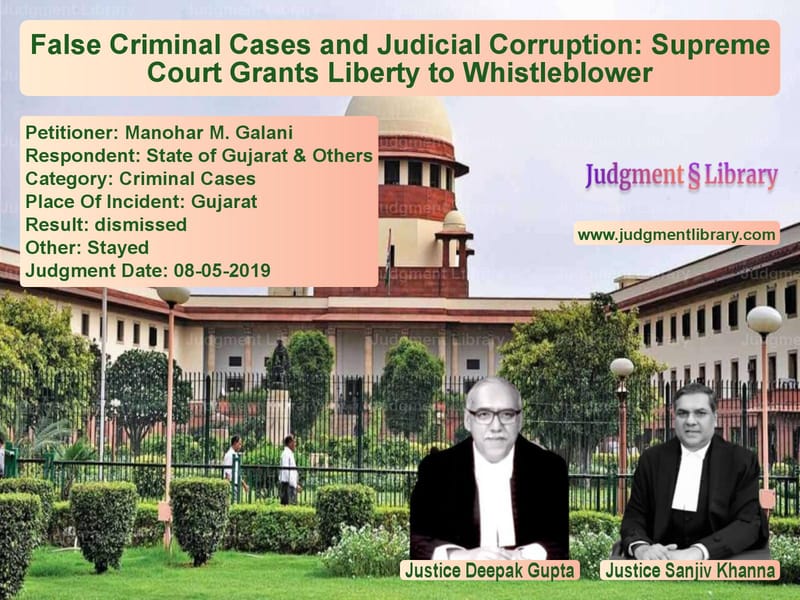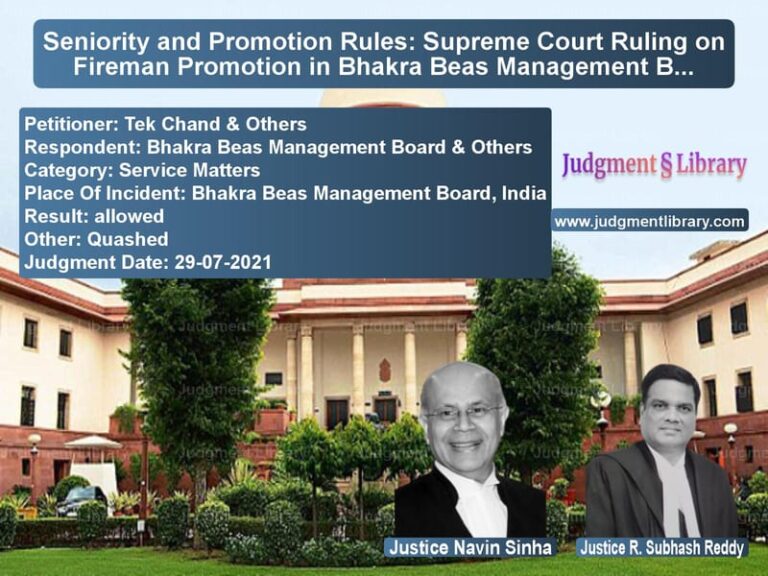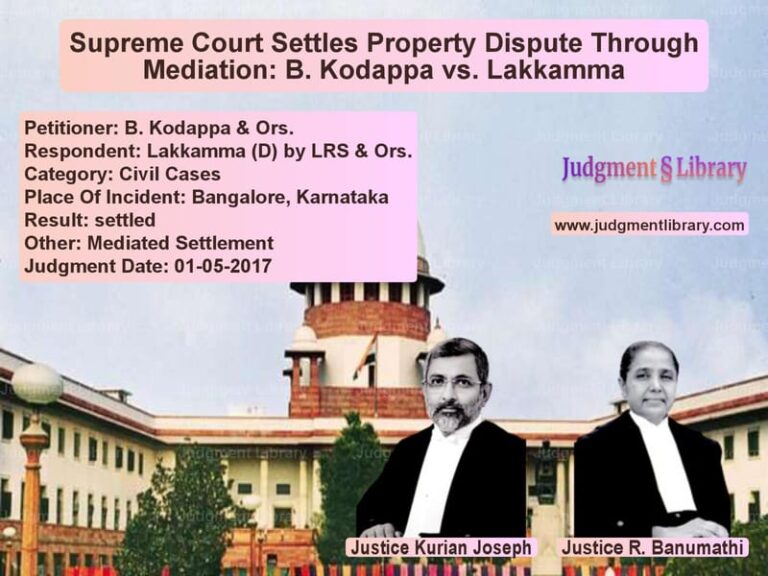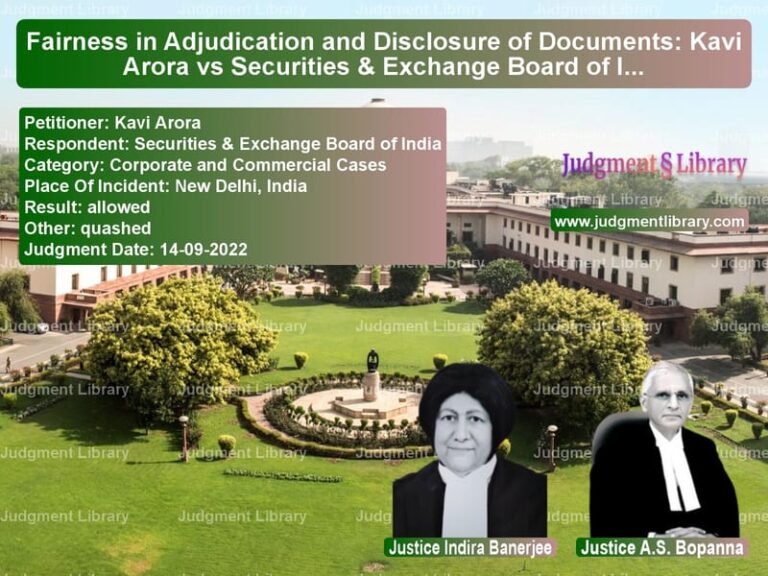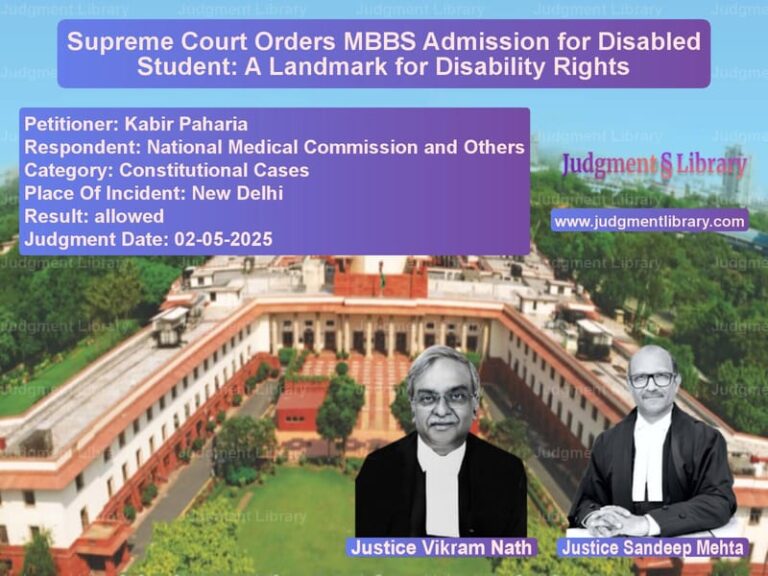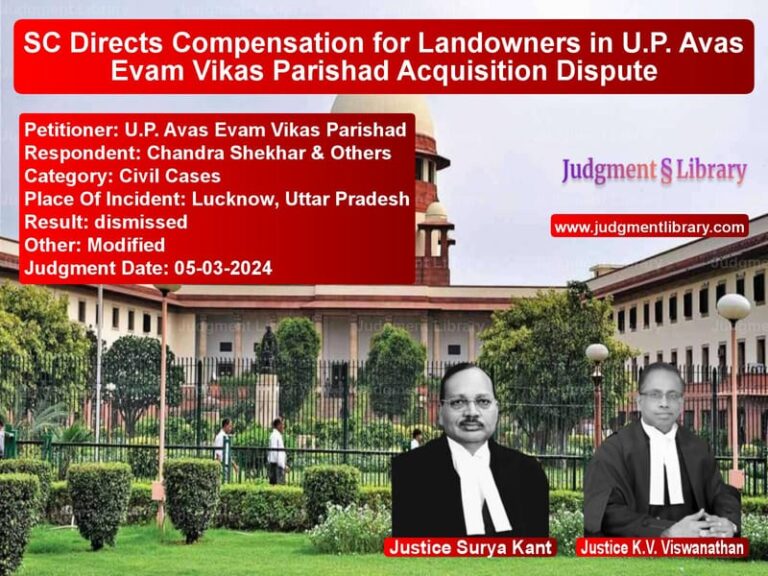False Criminal Cases and Judicial Corruption: Supreme Court Grants Liberty to Whistleblower
The case of Manohar M. Galani vs. State of Gujarat & Others revolves around the appellant’s struggle against false criminal cases allegedly filed as part of a racket involving corrupt lawyers and court officials in Gujarat. The Supreme Court, while dismissing his appeal, granted him the liberty to challenge the criminal proceedings before the High Court. The judgment highlights the misuse of judicial processes and the importance of protecting whistleblowers.
The appellant had been falsely implicated in multiple cases after a share market crash led an investor to hold him responsible for losses. The matter gained public attention when a journalist conducted a sting operation exposing how arrest warrants were being issued without proper verification, targeting influential individuals. Despite the High Court issuing directions to address judicial corruption, the appellant sought quashing of his cases, which the Supreme Court permitted him to pursue before the High Court.
Background of the Case
The appellant, Manohar M. Galani, was an employee of Punjab National Bank and assisted his sister in running a share brokerage firm, Jubilee Capital Market Services, in Ulhasnagar. In 1992, investor Kishore Keswani began trading through the firm but suffered losses after the stock market crash in 1993. Blaming Galani for his losses, Keswani allegedly orchestrated a legal campaign against him, filing multiple criminal and civil cases with the assistance of certain lawyers and court staff in Gujarat.
Keswani managed to initiate at least ten cases against the appellant and his family members, including one civil suit and nine criminal cases. Several cases led to the issuance of arrest warrants, resulting in the illegal detention of the appellant and his relatives.
Petitioner’s Arguments
The appellant, represented by Senior Advocate Gopal Sankarnarayanan, argued:
- The cases filed against him were fabricated and part of a larger racket in Gujarat where false cases were initiated through corrupt practices.
- Many of the complainants in the criminal cases were either non-existent or had never appeared before the court.
- The false arrest warrants issued against him and his family members were based on forged complaints and documents.
- A journalist’s sting operation confirmed the existence of a scam in which arrest warrants were being procured against prominent figures without due process.
- The Gujarat High Court, while investigating the scam, had acknowledged the issue but had not quashed the criminal proceedings against him.
- The cases had been pending since 1994, causing severe hardship and mental agony.
Respondent’s Arguments
The State of Gujarat, represented by legal counsel, countered:
- The cases against the appellant were part of the due legal process and should be adjudicated by the appropriate courts.
- The appellant had intervened in a public interest litigation (PIL) but had not initially sought relief for quashing his cases.
- The High Court had issued general directions to address the misuse of arrest warrants but had not granted specific relief to the appellant.
- The appellant had the legal option to file quashing petitions in individual cases before the High Court.
Supreme Court’s Analysis
The Supreme Court examined the appellant’s allegations, the High Court’s previous rulings, and the evidence regarding the judicial scam. Key legal observations included:
- The appellant was the whistleblower in the sting operation that exposed corruption in the judiciary.
- The High Court had acknowledged the existence of a racket where fraudulent arrest warrants were being issued.
- Although the PIL resulted in various judicial reforms, the specific cases against the appellant remained pending.
- The appellant had not formally sought quashing of the proceedings in the High Court, limiting the scope of the Supreme Court’s intervention.
- He was granted the liberty to file appropriate petitions for quashing before the Gujarat High Court.
Key Judicial Findings
The Supreme Court ruled:
- The appellant’s cases would remain stayed for six weeks to allow him to approach the High Court for quashing proceedings.
- The High Court would have the discretion to quash cases based on the merits of individual complaints.
- In pending civil and cheque bouncing cases, courts would issue notices only if the complainant appeared and expressed interest in pursuing the case.
- Trials in all related cases should be concluded expeditiously, ensuring no further harassment.
Conclusion and Impact
The Supreme Court’s ruling acknowledges the possibility of abuse of legal processes but reinforces the principle that cases should be decided by the appropriate forums. The judgment allows the appellant to challenge the false cases but stops short of directly quashing them.
This decision serves as an important precedent for whistleblowers who expose judicial corruption while ensuring that legal remedies remain available to challenge false prosecutions.
Petitioner Name: Manohar M. Galani.Respondent Name: State of Gujarat & Others.Judgment By: Justice Deepak Gupta, Justice Sanjiv Khanna.Place Of Incident: Gujarat.Judgment Date: 08-05-2019.
Don’t miss out on the full details! Download the complete judgment in PDF format below and gain valuable insights instantly!
Download Judgment: Manohar M. Galani vs State of Gujarat & O Supreme Court of India Judgment Dated 08-05-2019.pdf
Direct Downlaod Judgment: Direct downlaod this Judgment
See all petitions in Fraud and Forgery
See all petitions in Legal Malpractice
See all petitions in Judgment by Deepak Gupta
See all petitions in Judgment by Sanjiv Khanna
See all petitions in dismissed
See all petitions in Stayed
See all petitions in supreme court of India judgments May 2019
See all petitions in 2019 judgments
See all posts in Criminal Cases Category
See all allowed petitions in Criminal Cases Category
See all Dismissed petitions in Criminal Cases Category
See all partially allowed petitions in Criminal Cases Category

